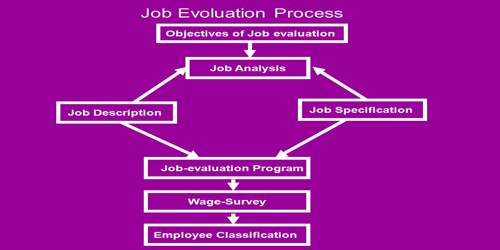Job evaluation is the systematic process for assessing the relative worth of jobs within an organization. It involves a systematic study and analysis of job duties and requirements. It allows employers to analyze jobs in terms of both salary and organizational fit. If you have a standard technique for evaluating jobs, you can identify similarities and differences in the work performed, the levels of responsibility, and the skills and qualifications involved in the positions.
Important Features of Job Evaluation
Job evaluation has some importance and features as follows:
- Job evaluation helps to rate the job
It is a technique which helps to rate the job in terms of complexities and importance. It rates the job but the job holder. This helps to determine and fixing wages accordingly.
- Job evaluation helps to determine pay structure
It is a consistent and rational process of determining wages and salary structure for various levels of jobs. Internal and external consistencies are analyzed in order to determine wage levels.
- Job evaluation helps in bringing harmonious relation between labor and management
It brings harmony and good labor relation through eliminating wage inequalities within the organization.
- Job evaluation helps to minimize the cost of recruitment and selection
It helps in keeping down the recruitment and selection costs as it assists in retaining employees. It means, job evaluation inspires for keeping down the labor turnover, as a result of which there will be less need for new recruitment. Moreover, due to the systematic analysis of various aspects of jobs, recruitment and selection can be made by matching the qualification and candidate.
- Job evaluation helps to differ job other than skills
It considers risks and other factors of the job rather than skills in order to determine the worth of jobs. Hence, jobs are no longer differentiated with skills.
- Job evaluation helps to determine the cost and rate of production
It determines an efficient wage structure according to workload, hence, worker’s productivity will be increased thereby increasing the rate of production.
- Job evaluation helps to determine the requirement for training and development
It identifies training and development requirements by comparing the complexity and importance of various jobs. Highly complex and critical job exposes training need.
- Job evaluation helps to minimize cost
Through the productivity enhancement and increasing the rate of production, the per unit cost of an output is minimized or reduced.
Information Source:
















